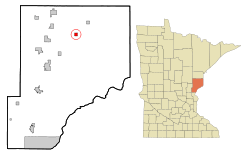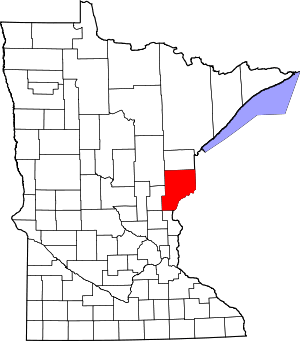Bruno, Minnesota
Bruno is a city in Pine County, Minnesota, United States. The population was 102 at the 2010 census.[8]
Bruno | |
|---|---|
 Location of the city of Bruno within Pine County, Minnesota | |
| Coordinates: 46°16′41″N 92°39′51″W | |
| Country | United States |
| State | Minnesota |
| County | Pine |
| Incorporated | 29 August 1903[1] |
| Government | |
| • Mayor | Denny Molgaard[2] |
| Area | |
| • Total | 1.00 sq mi (2.58 km2) |
| • Land | 1.00 sq mi (2.58 km2) |
| • Water | 0.00 sq mi (0.00 km2) |
| Elevation | 1,152 ft (351 m) |
| Population | |
| • Total | 102 |
| • Estimate (2019)[5] | 99 |
| • Density | 99.30/sq mi (38.32/km2) |
| • Demonym | Brunoine |
| Time zone | UTC-6 (Central (CST)) |
| • Summer (DST) | UTC-5 (CDT) |
| ZIP code | 55712 |
| Area code(s) | 320 |
| FIPS code | 27-08290[6] |
| GNIS feature ID | 0640554[7] |
Minnesota State Highway 23 serves as a main route in the community.
Geography
According to the United States Census Bureau, the city has a total area of 1.00 square mile (2.59 km2), all land.[9]
History
Named after Bruno Township, after an early hotel owner there,[10] the city of Bruno was incorporated on 29 August 1903. Before, the Eastern Railway Company of Minnesota operated a station in 1887 known as Mansfield Station, a village owned and platted by Fitzhugh Burns. Post office service began in 1896. Because many of the early settlers were from Czechoslovakia, the city may also have been named for Brno, a village in the Czech Republic.
Community
Bruno is a small town, intersected by Minnesota State Highway 23. The town has three churches, a U.S. Post Office (ZIP code 55712), an auto repair shop, a thrift store, volunteer fire department and a tavern. The tavern offers limited food and drinks, but has recently added free Wi-Fi wireless Internet service, which one is not likely to find for free between North Branch and Duluth. In late 2014, the tavern was destroyed in a fire but, in spring 2015, plans to rebuild were announced on its Facebook page. There is also a small park for travelers to park and rest with restrooms and a well for fresh water. Bruno is the location of Nemadji Research Corporation.
Demographics
| Historical population | |||
|---|---|---|---|
| Census | Pop. | %± | |
| 1910 | 229 | — | |
| 1920 | 217 | −5.2% | |
| 1930 | 167 | −23.0% | |
| 1940 | 234 | 40.1% | |
| 1950 | 193 | −17.5% | |
| 1960 | 116 | −39.9% | |
| 1970 | 130 | 12.1% | |
| 1980 | 130 | 0.0% | |
| 1990 | 89 | −31.5% | |
| 2000 | 102 | 14.6% | |
| 2010 | 102 | 0.0% | |
| Est. 2019 | 99 | [5] | −2.9% |
| U.S. Decennial Census[11] | |||
2010 census
At the 2010 census,[4] there were 102 people, 44 households and 29 families residing in the city. The population density was 102.0 per square mile (39.4/km2). There were 53 housing units at an average density of 53.0 per square mile (20.5/km2). The racial makeup of the city was 92.2% White, 1.0% African American, 4.9% Native American, and 2.0% from two or more races.
There were 44 households of which 22.7% had children under the age of 18 living with them, 50.0% were married couples living together, 9.1% had a female householder with no husband present, 6.8% had a male householder with no wife present, and 34.1% were non-families. 29.5% of all households were made up of individuals and 18.1% had someone living alone who was 65 years of age or older. The average household size was 2.32 and the average family size was 2.86.
The median age was 47 years. 23.5% of residents were under the age of 18; 6.9% were between the ages of 18 and 24; 17.6% were from 25 to 44; 27.3% were from 45 to 64; and 24.5% were 65 years of age or older. The gender makeup was 50.0% male and 50.0% female.
2000 census
At the 2000 census,[6] there were 102 people, 44 households and 28 families residing in the city. The population density was 102.0 per square mile (39.4/km2). There were 56 housing units at an average density of 56.0 per square mile (21.6/km2). The racial makeup of the city was 96.08% White, 0.98% African American and 2.94% Native American.
There were 44 households of which 22.7% had children under the age of 18 living with them, 50.0% were married couples living together, 15.9% had a female householder with no husband present, and 34.1% were non-families. 27.3% of all households were made up of individuals and 9.1% had someone living alone who was 65 years of age or older. The average household size was 2.32 and the average family size was 2.83.
25.5% of the population were under the age of 18, 7.8% from 18 to 24, 22.5% from 25 to 44, 27.5% from 45 to 64, and 16.7% who were 65 years of age or older. The median age was 43 years. For every 100 females, there were 78.9 males. For every 100 females age 18 and over, there were 85.4 males.
The median household income was $28,125 and the median family income was $33,125. Males had a median income of $31,875 and females $15,000. The per capita income was $15,439. There were 18.5% of families and 19.0% of the population living below the poverty line, including 100.0% of under eighteens and none of those over 64.
References
- http://www.lakesnwoods.com/Bruno.htm
- "Archived copy". Archived from the original on 2018-03-04. Retrieved 2017-07-28.CS1 maint: archived copy as title (link)
- "2019 U.S. Gazetteer Files". United States Census Bureau. Retrieved July 26, 2020.
- "U.S. Census website". United States Census Bureau. Retrieved 13 November 2012.
- "Population and Housing Unit Estimates". United States Census Bureau. May 24, 2020. Retrieved May 27, 2020.
- "U.S. Census website". United States Census Bureau. Retrieved 31 January 2008.
- "US Board on Geographic Names". United States Geological Survey. 25 October 2007. Retrieved 31 January 2008.
- "2010 Census Redistricting Data (Public Law 94-171) Summary File". American FactFinder. U.S. Census Bureau, 2010 Census. Retrieved 23 April 2011.
- "US Gazetteer files 2010". United States Census Bureau. Archived from the original on 2 July 2012. Retrieved 13 November 2012.
- Upham, Warren (1920). Minnesota Geographic Names: Their Origin and Historic Significance. Minnesota Historical Society. p. 411.
- "Census of Population and Housing". Census.gov. Retrieved 4 June 2015.
